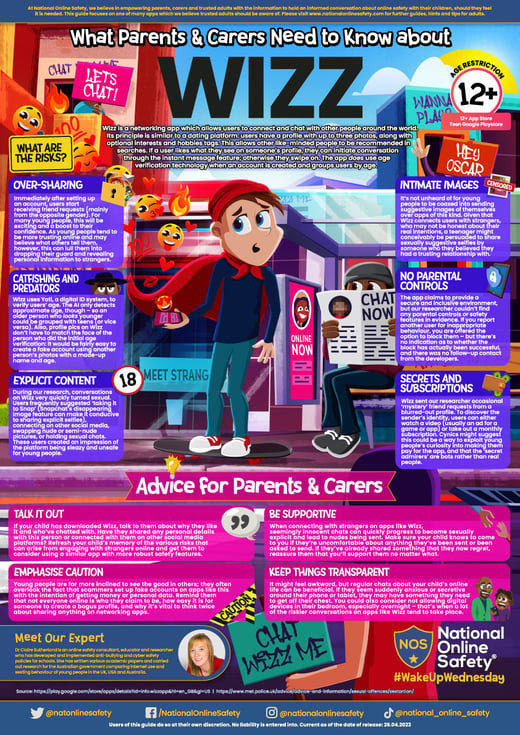Free Online Safety Guide
What Parents and Carers Need to Know about Wizz
In an age where empathy and understanding are more valuable than ever, apps like Wizz – which connect users with potential new friends – can be incredibly welcome. Pairing people with others who share their interests, the app can unite mutual fans of the same music, find fellow foodies to exchange recipes with or recruit new players for someone’s favourite online game.
Indeed, the app’s tagline promises to “expand your world”. Is that expansion totally safe, however? As this week’s #WakeUpWednesday guide finds out, Wizz’s age verification system isn’t infallible – so, with the possibility of young people being matched with much older users, trusted adults might want to familiarise themselves with how this trending app actually works.
Read on to access your free guide ...
|
 |
|
As of spring 2023, Wizz sits in the App Store’s top 20 social networking downloads and has amassed an impressive 10 million users globally. The majority of its user-base hail from Generation Z (that’s anyone currently between the ages of about 8 and their early 20s), with the app’s aim being to enable young people to forge rewarding online connections with others.
Despite its verification processes and security checks, Wizz can still be prone to risk, however. Bypassing the age limit of 13 isn’t particularly difficult, and – regrettably – wherever young people gather to chat online, potential predators and the possibility of explicit material are seldom far behind. Our #WakeUpWednesday guide has the lowdown on Wizz.
|
Your Online Safety News
In this week’s round-up, we’ve got stories on fake online reviews becoming illegal in the UK; the disturbing meaning behind TikTok’s ‘April 24’ trend; and the removal of social media content advertising the services of people smugglers.
|
|
New rules ban subscription traps and fake reviews
|
|
Buying, selling or hosting fake reviews will become illegal as part of changes planned under the UK government's new Digital Markets, Competition and Consumer Bill.
|
|
Twitter gives fake Disney account verified status
|
|
A fake Twitter account purporting to belong to Disney was given a gold tick by the platform, despite tweeting vile content, before being suspended.
|
|
Extreme online child sexual abuse material doubles
|
|
Newborns and toddlers are among the victims of the most severe online sexual abuse, with the amount of extreme material doubling over the last two years.
|
|
The meaning behind the April 24 trend on TikTok
|
|
April 24 has become a disturbing trend on TikTok, unofficially marking it as ‘National Rape Day', on which some men have used the platform to encourage each other to commit sexual assaults.
|
|
NCA and social media combine to tackle illegal immigration
|
|
Thousands of social media pages advertising the services of people smugglers have been removed after an agreement between the NCA and five major social media companies.
|
|
TikTok moves to ban climate change denial content
|
|
TikTok is taking a stance against climate change misinformation, outlawing content that ‘undermines well-established scientific consensus’.
|
|
Keep on top of statutory training requirements and raise standards with award-winning CPD
Upgrade your account today to add The National College to your membership; including statutory training and an ongoing programme in response to the latest policies, best practice, and education research.
This will mean your school has access to all eight of our categories, with over 2,600 role-specific webinars, courses and resources available to your workforce.
|
Get involved in #WakeUpWednesday
|
|
Head Office, National Online Safety, Oswald Road, North Lincolnshire DN15 7PA, United Kingdom, 0333 090 6536
Manage preferences
|
|
|